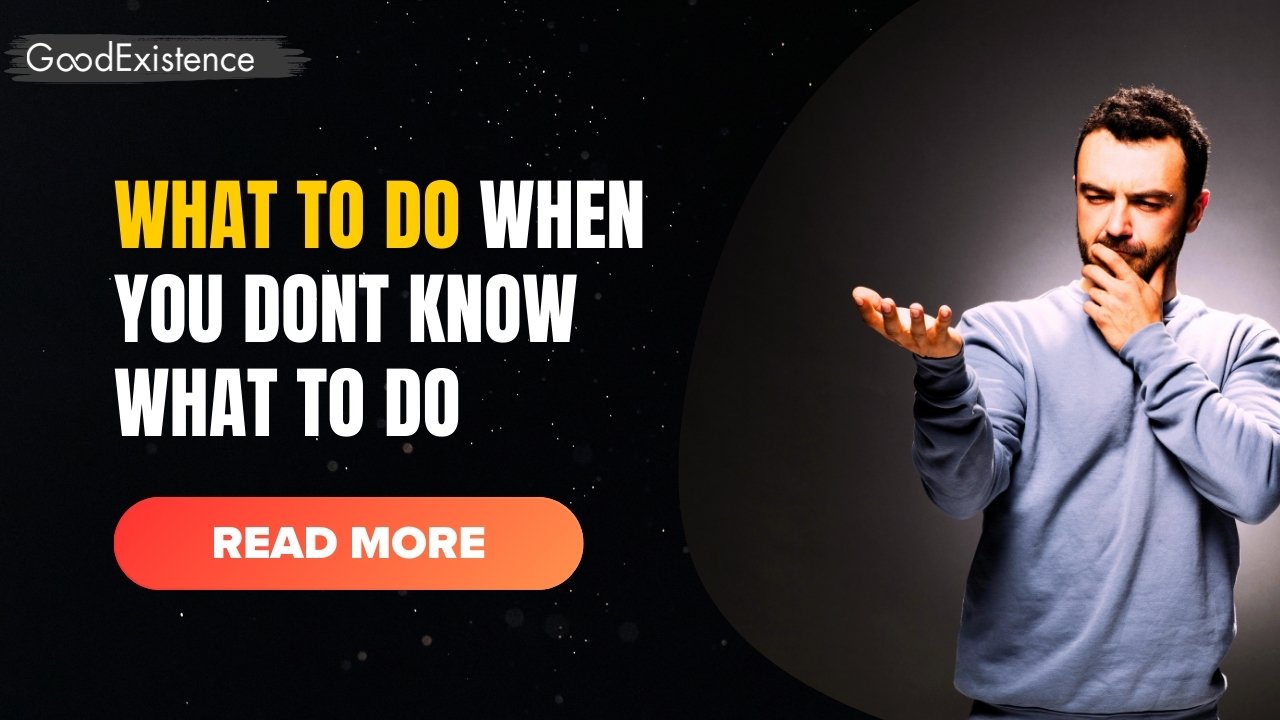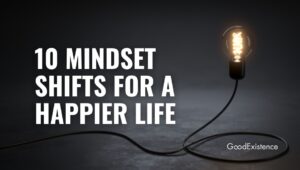I don’t know how common this issue is but, I know for sure I’m not the only one that doesn’t know what to do, even if I want to do something.

Confusing?
I know… let me explain…
So basically life has its ups and downs, twists and turns, highs and lows, you name it.
For the past few months, I’ve started to distance myself more and more from running websites and publishing content… not because it’s not rewarding, but because I’m tired of constantly fighting with Google and other search engines every time they update their algorithms.
I like to write and run the Good Existence blog even if it doesn’t bring me any money (it doesn’t anyway)… but at some point, you reach a stage where you just ask yourself if it’s really worth it.
And then it happens and I ask myself: Do I continue publishing or do I sell/shut down all the sites and focus on something else? So this is today’s topic: What to do when you don’t know what to do.
This is just my example currently, but I’m sure you’re probably going through some similar things in your own life, whether you don’t know how to handle a certain situation with a colleague from work, or you can’t decide on a car model, or where to go to vacation next holiday.
This type of anxiety that comes from decision-making takes hold over our life and then we sit and do nothing. I know I’m at fault for this… but here are a couple of methods you can use to become more decisive:
Embrace the Power of Small Steps
One effective method to combat indecision and overwhelm is to break down the problem into smaller, manageable steps.
Instead of trying to tackle everything at once, focus on the next immediate action you can take.
For instance, if you’re struggling to work on a project that you either don’t like or don’t have confidence that it will succeed, you might want to try and start doing something about it, even if it’s not something time-consuming or important.
Small steps build confidence and gradually lead to bigger achievements.
My example: Whenever I feel like I’m not in the mood to write an article or do some other things for marketing, I just start working 2-minutes, either on a title, outline, or draft… then those 2 minutes turn into 1-2 hours of productive work and I successfully tricked my brain into starting it in the first place.
Seek Clarity Through Reflection
Sometimes, the best way to address indecision is to step back and reflect. Take some time to understand your motivations, goals, and values.
Journaling or creating a list can be a powerful tool for this. Write down your thoughts and feelings about the decision you’re facing.
What are the pros and cons? What excites you about one option, and what drains your energy about another?
When you put your thoughts on paper, you can gain a clear insight into what you truly want.
I do this for example with countries I’d like to visit or to move to next. I create a list of PROs and CONs, and I start adding things like:
- Things to visit and see
- How expensive is it (hotels, taxis, food, extra stuff, etc)
- Things that interest me in that particular location/country
- Would I move there if I had the chance?
- Is it a good place to raise a family? (Safe, good healthcare, etc)
- … and many more
These are just examples, my list is actually way longer, sometimes I even score these points for example: How expensive is it? I would give it a 1/10 if I were to talk about Monaco, and maybe a 7/10 for Warsaw, Poland.
You get the point… at the end, I add up all the numbers and do a total score, and I just follow the results (not always, but sometimes).
You don’t have to make it this complex, but if you want to know what to do when you don’t know what to do, well then, this system might help you out.
Consult with Others
Don’t underestimate the value of seeking advice from trusted friends, family, priests, or mentors. They can offer different perspectives and may provide solutions you hadn’t considered.
Discussing your dilemmas with others can also relieve some of the pressure, making the decision-making process feel less isolating.
Limit Your Options
Paradoxically, having too many options can paralyze us. This is known as the paradox of choice. To mitigate this, try to limit your options.
If you’re struggling to decide on a type of car for your family, narrow it down to just a couple of models by doing some extensive research first, and then when you end up with just 2-3 models create a list of PROs and CONs as I’ve explained above.
There are so many new vehicles being launched each year and so many different type of cars, from sedans to crossovers, SUVs and trucks, that it’s quite challenging to pick a good car for your needs.
So focus on what’s most important to you (Safety ratings, MPG, cargo space, etc.) and go from there.
In the end, reducing the number of choices you have, makes you more confident that you will make a good and decisive choice.
Take a Break
No, seriously, just detach yourself from the problem/issue you’re facing for a little bit.
Sometimes, stepping away from the problem can provide much-needed clarity.
Engage in activities that relax and rejuvenate you.
Whether it’s a walk in nature, a hobby, or spending time with loved ones, taking a break can help clear your mind.
Often, the best ideas and solutions come when we’re not actively trying to solve the problem, I get them when I’m on a treadmill at the gym for example.
Some decisions require a much bigger break than others though, I’ve used to not do anything even for weeks and months before finally pulling the trigger and deciding over a thing.
It’s not recommended maybe to wait so much (especially if it’s an important matter), but when things don’t go your own way or at least how you’ve hoped, you have to think that maybe it’s for the best and that something better or a better solution will come around (and most of the time that’s true).
Trust Your Intuition
While it’s essential to weigh pros and cons, don’t discount your gut feelings. Your intuition is often informed by your experiences and deep-seated knowledge about what’s best for you. If you feel strongly inclined towards a particular decision, give it serious consideration. Your inner voice is a valuable guide.
Well, at least that’s what psychologists call it. For Christians, this is also a time to quiet down, pray, and seek God’s guidance. In moments of uncertainty, turning to prayer can provide a sense of peace and clarity. It’s about creating a space for stillness, where you can listen for God’s wisdom and direction. This practice can be deeply comforting and can help illuminate the path forward.
When you pray, you’re not just asking for answers; you’re also opening yourself up to receiving insights that may not be immediately obvious.
It’s a way to align your decisions with your faith and values, trusting that God’s plan for you is unfolding, even if it’s not entirely clear at the moment.
It’s also recommended that you talk to your priest, or to a monk, and they will be able to guide you or give you some direction at least.
Embrace Uncertainty
It’s important to acknowledge that no decision is without risk or uncertainty. Accepting this can liberate you from the paralysis of wanting to make the perfect choice.
Understand that every decision has its potential upsides and downsides, and that’s okay.
Embrace the journey and be open to learning from whatever outcomes arise.
In the end…
Decision-making can be daunting, especially when you’re faced with uncertainty and doubt.
However, by taking small steps, reflecting on your goals, seeking advice, limiting your options, taking breaks, trusting your intuition, and embracing uncertainty, you can navigate this challenge more effectively.
Remember, it’s perfectly normal to feel stuck at times, but with these strategies, you can move forward with greater confidence and clarity.
Actionable Steps
- Break It Down: Identify the smallest action you can take towards your decision and do it.
- Reflect: Spend 10-15 minutes journaling about your decision.
- Ask for Advice: Reach out to one person you trust and discuss your dilemma.
- Simplify Choices: Narrow down your options to two or three possibilities.
- Take a Break: Engage in a relaxing activity and revisit the decision with a fresh mind.
- Listen to Yourself: Pay attention to your gut feelings and consider them seriously.
- Accept Imperfection: Recognize that no choice is perfect and that’s okay.
Implementing these steps can help you find clarity and direction in times of uncertainty. Remember, the goal is progress, not perfection.





